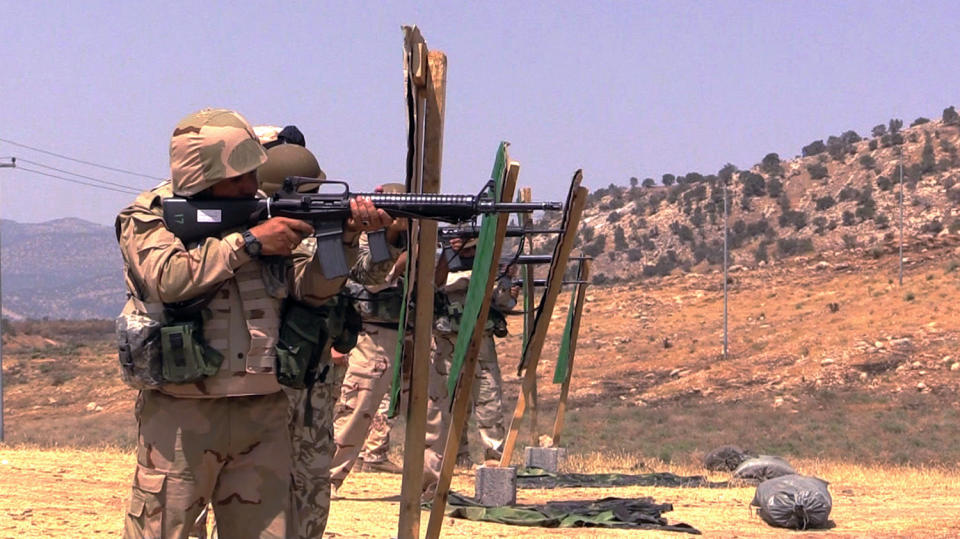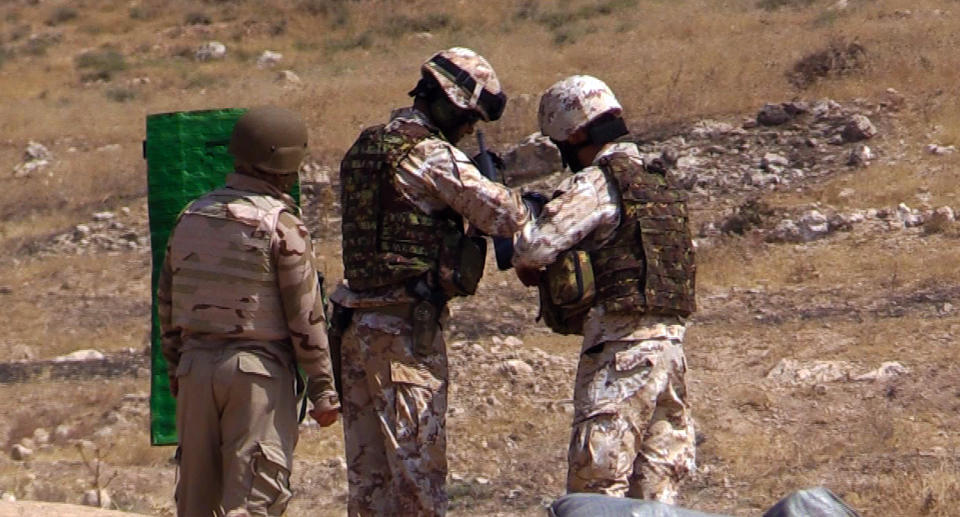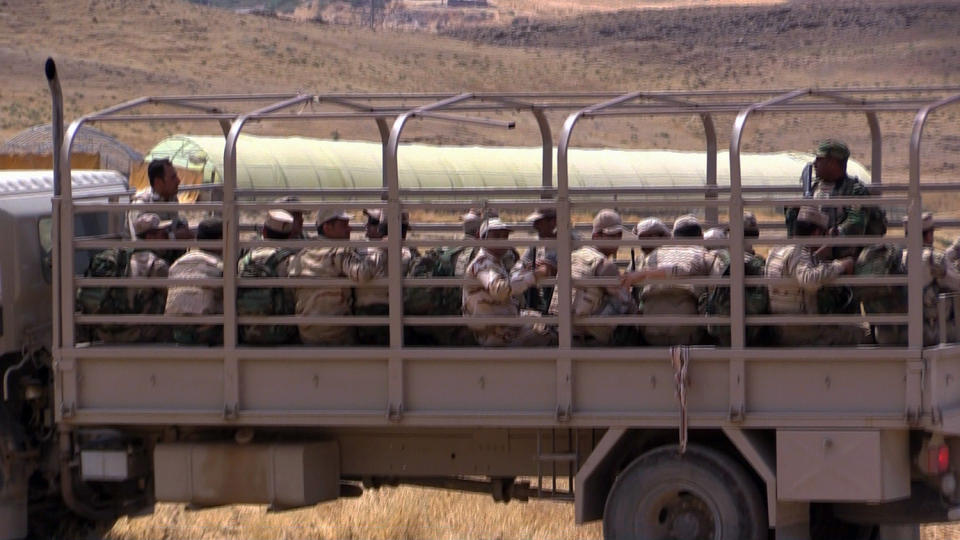On the ground with the peshmerga, preparing to retake Mosul
Article written by Ash Gallagher for Yahoo News

ERBIL, Iraq — Kurdish peshmerga forces in Northern Iraq raise their rifles during another day of training; Italian soldiers carefully instruct them on how to accurately hit their target, which is a dummy board 25 meters away.
For many peshmerga, it is the first time they have fired an M16 assault rifle. They are learning new methods of fighting and experimenting with new firearms.
They are exchanging Russian weapons for American ones.
Their shots pop across the field, and small puffs of smoke jump off the ground as bullet shells are shed on the grassy hills.
When they’ve finished their rounds, they walk down the line to their targets with coalition trainers to review their shots and see if they made their target.
In another area of the base, soldiers sit in the shade with unloaded M16s, practicing disassembling and reassembling the weapons. Each one carefully lays the pieces of the weapon in front of him and then works out the right way to put it back together again.
At three different locations in Northern Iraq, the United States and coalition forces from seven nations are training nearly 2,500 peshmerga soldiers in infantry tactics, heavy weapons training as well as medical and chemical training.
At this base, Italian soldiers were conducting most of the training. The American military is not directly training the peshmerga, but takes a supporting role, advising on U.S. weapons and equipment.
The Kurdish peshmerga soldiers have a reputation as one of the toughest fighting forces in the region.
They are in training, now, for what some consider one of the most important battles in the war against the Islamic State — the fight to retake Mosul. The armed group has controlled the key Iraqi city for more than two years.
A U.S. Army spokesperson in Erbil told Yahoo News, “The training is 10 weeks. [Then] they’re given back to the ministry of peshmerga” to be assigned to units facing off with fighters from the Islamic State.
Some of the men were old enough to have adult sons and have been fighting for many years. But the U.S. spokesperson believes their experience will help with the younger soldiers and in the fight ahead.
“Some have [already] been on the front line,” the spokesperson said. “They’re motivated, and we give them brand-new equipment.”
The peshmerga soldiers seemed grateful to the coalition forces for their training and excited to learn new tactics.
Between training sets, they laugh and joke with each other, but when it’s time to focus, they work hard over the long days of the burning summer.
One of the peshmerga ground commanders, Wassim, has 32 men under him; he told Yahoo News, “We learn [to fight] three ways: while stand, on our knees and on the ground. We also learn about IEDs [improvised explosive devices].” Identifying and dealing with IEDs is an essential skill for fighting ISIS.
Another soldier, Aram, who had only been training for two weeks, said, “We want to thank the coalition for the training, and we feel we are more ready. We are learning many things.”

The United States government announced in April it would commit nearly $415 million to aid the peshmerga forces, for various purposes including weapons, training and monthly stipends for fighters.
A military spokesman for coalition operations in Iraq and Syria, Col. John Dorrian told Yahoo News: “We [the U.S.] do provide a lot of funding for the peshmerga and continue to do so because they are a critical element, but ultimately the framework that we have says that the government of Iraq is in charge.”
The entire coalition is made up of 60 countries, and the aim that unites everyone, Dorrian said, is to defeat ISIS. “One unifying factor, all of these groups, everyone has an interest in the eradication of ISIS,” he said. “They have to be militarily defeated here, as a foundational step, and then continued work must be done to drain the swamp on their sick ideology.”
Coalition forces have been closing in on Mosul since the Iraqi army took control of a key town, Qayyara, in recent days. ISIS fighters set fire to the oil wells when they fled. But the Iraqi army officials are confident their operations are putting them in a good position to defeat the armed group.
As for the peshmerga, they will play a supporting role to the Iraqi army in taking back Mosul.
Jabar Yawar, the chief of staff and spokesperson for the Peshmerga Ministry, said in a statement to Yahoo News, “We decided to participate in the liberation of Mosul, but what our role [will be], we do not know. We have not had any formal meeting with the Iraqi leadership and the coalition leadership about what role to put our forces.”
Yawar went on to explain they hope to work with the Iraqi government on a plan for an administrative role in the government after the city has been liberated.
The U.S. military says it is partnering with the coalition forces, and while it will provide airstrikes, its role on the ground will continue to be in an “advise and assist” capacity. The U.S. has officials who will work with the Iraqi army forces on battle logistics and tactical strategy.

With the fight intensifying, humanitarian concerns have risen. A camp in the northern province of Nineveh reported that more than 4,000 internally displaced people (IDP) arrived in the past two weeks.
Aid groups are scrambling to get food and assistance to those who are able to escape from Mosul, but they are also trying to anticipate a mass movement of Iraqi citizens in the coming weeks while forces push closer.
Yawar stated the peshmerga are working with humanitarian organizations to set up camps near the cities of Dohuk and Makmour.
But according to Iraqi media reports, the Kurdish minister for migration and displacement has said Mosul IDPs will be pushed to resettle in Iraqi-army-controlled areas of the country.
A major concern for the aftermath is how to ensure that ISIS fighters don’t escape Mosul and establish a new foothold in northern Iraq.
For the men still training, they know the time is coming when they will have to risk their lives for their homeland. But they are confident and believe they have the military strength and training to help defeat one of the worst threats they have ever faced.


